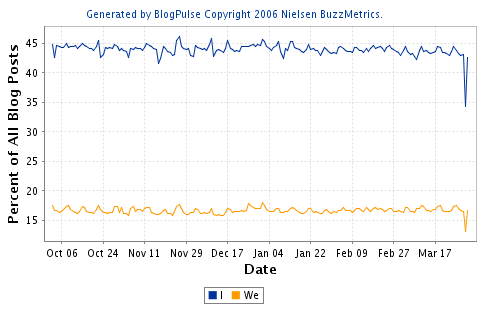Are we bloggers individualistic or cooperative?
One can suggest that we bloggers share a community focus. Others may suggest we are individuals in search of self esteem and social recognition.
On academic studies we do find differences in “social orientations” between cultures and societies (see ” social orientation”-article on pdf). I will try to investigate this question using a more simple straight forward test: comparing between the use of the word “I” to the word “we”.
Using blogpulse search engine (see graph 1) I found that in blogs “I” is being used three times more than “we” (”I” is found in about 0.45% of all posts, while “we” is being used in 0.16% of all posts).
In order to normalize it and compare it to the English word frequency I used the Brown Corpus Word Frequency. According to their list (edict wordlists), the use of “I” is about twice as much as the word “we” (0.50%, 0.26% respectively, see graph 2).
It turns out that while we blog we use much less “we” than we would normally use (in English language) (0.16% versus 0.26%) and that on blogs we have a much larger difference between the “I” and the “we” (3 times larger in blogs, two times larger in the English language).
I (not “we”) can conclude from this investigation that we (and not only “I”) blog with a more egocentric motive and from an individualistic perspective. Having this finding in mind we bloggers can be inspired to further shape our community values.

graph 1: use of “I and “we” in blogs

graph 2: use of “I and “we” in the English language
![]() Tweet This Post
Tweet This Post ![]() Plurk This Post
Plurk This Post ![]() Buzz This Post
Buzz This Post ![]() Delicious
Delicious ![]() Digg This Post
Digg This Post ![]() Ping This Post
Ping This Post ![]() Reddit
Reddit ![]() Stumble This Post
Stumble This Post






![Validate my RSS feed [Valid RSS]](http://www.trendsspotting.com/blog/wp-content/images/valid-rss.png)


May 10th, 2007 at 8:43 am
A blog is usually written by a single person. He or she is more likely to use “I” than “we”. The framework of communication is responsible for this situation, not the characteristics of bloggers themselves.
May 10th, 2007 at 9:23 am
This is a crude analysis.I(yes I) don’t like the idea of using such bad statistics to prove “I” is used more then “we” .My concerns are:
1) How many unique instances are counted as one ? By that I mean does “I” appeared once or more then in a blog.
2) How many blogs are analyzed?
3) What are the lengths(word counts) of blog? What kind of statistical distribution is that? It would be better to normalize the occurrence of I with the word count.
It looks like it would be interesting to do a quantitative analysis on such topic though.
Peace
May 11th, 2007 at 6:39 am
We reveal ourselves in our body language and our blogging language and so we should welcome any survey that confirms that we all possess a certain percentage of egocentricity.
Lovers of Surveys must surely be equally, if not more so egocentric, for no statistic on Earth is a form of unconditional love, all statistics are measures and the measures we are interested in are driven through an egotistical framework not a spiritual one.
Not that spiritual experiences are free from ego, some of the worst occurrences of people pretending to be spiritual are those whose ego’s are addicted to spirituality and claim to be spiritual.
No one is therefore 100% egocentric, no one is 0% but what we do know is that egocentricity isn’t an intelligence but a primary glue of our man-made social networking, otherwise we would do much more humbler jobs and be fully capable of sharing 50% of the housework in a household where the wife does 100%.
M.
Note: Explorative
May 11th, 2007 at 11:00 am
Bloggers operate as constantly changing ad-hoc communities, which are formed through linking, trackbacks, and comments.
May 11th, 2007 at 4:49 pm
I- .5099
have- .3880
no
idea
what
you- .3234
all- .2954
are- .4325
talking
about.
In my example above I score a whopping 10% compared to a measly fraction of one percent.
My conclusions:
1. Yet another example of my writing being way above average.
2. Yet another example of me being over ten times more egotistical than the average blogger.
(Please excuse my disruptive ignorance. But this is cheaper for me than therapy. I’ll leave you nice folks alone now.)
May 13th, 2007 at 6:27 pm
[…] Trendspotting untersuchte die Häufigkeit der Begriffe “we” und “i” und kommt zum Schluss: It turns out that while we blog we use much less “we” than we would normally use (in English language) (0.16% versus 0.26%) and that on blogs we have a much larger difference between the “I” and the “we” (3 times larger in blogs, two times larger in the English language). […]
May 14th, 2007 at 10:34 pm
[…] source:http://www.trendsspotting.com/blog/?p=89 […]
May 22nd, 2007 at 8:17 am
[…] Concluindo, e só para esquentar, o blog “Trendsspotting”? fez uma pesquisa perguntando? “Nós blogueiros somos? individualistas ou cooperativos?” Filtrando as palavras na blogosfera, descobriram que a palavra “EU” é três vezes mais usada do que a palavra “NÓS” e que portanto os blogueiros são mais individualistas. Há controvérsias nos comentários, olha lá. Mas antes disso, conta aí: o que você acha? […]
December 15th, 2007 at 4:41 am
very interesting, but I don’t agree with you
Idetrorce
January 20th, 2009 at 2:59 am
Where I can to find blogs on this topic?
January 22nd, 2009 at 2:33 am
Superd! I’ll do simliar post in on blog
December 11th, 2010 at 5:31 am
I was lucky, because everything installed without major hazzles